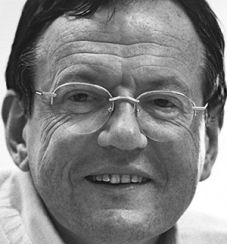In fact, throughout his entire career he has been expanding networks worldwide, connecting people and encouraging what he calls the Internet’s “freewheeling spirit.” So how can that spirit of creativity and open development be preserved?
In a recent chat via phone, he pointed out that three main groups have roles to play in that effort.

The first is engineers. “They are extremely creative, but they have to understand that the things they make are used by non-engineers. Early Internet engineers thought they were connecting engineers to one another, but what the Internet actually did was create connections between people,” he said. “Back in the 70s, when interconnectivity began, the Net was designed by and for us – the engineers. But engineers make a huge mistake in assuming that the average user of their product is an engineer.” What the Internet actually achieved, Davies notes, is vastly different from what it was originally meant to do: “It achieved a global connectivity that no one foresaw.” People began using it for sharing photos, finding directions, playing games, watching movies. He suggested that Internet engineers should be more like the folks who lay out department stores, where the stuff people buy on impulse is on the main floor, and the stuff people need – the sheets and blankets – are on the lower level.
The second group with a role to play in preserving the Internet’s original spirit is the users. The best thing we all can do to help the Internet, Davies says, is to use it. “Voting with our feet” – and wallets – makes a difference to developers. “We have to make the Internet more customer-focused,” he said. He offered a familiar commercial example: iTunes. “That was implemented by engineers, but it focuses on accessibility, simplicity and ease of use. While engineers were devoting themselves to achieving great sound quality, users were saying, ‘I don’t really mind about that, as long as I can hear my music whenever I want.’” “It’s the same with mobile phones, he added. “People buy them despite their poor sound quality. Internet developers should keep that lesson in mind: It’s important to have a customer mindset. We engineers aren’t trained to think that way, but we should be. Usability is key.”
The third group that Davies believes has a role to play in keeping the Internet creative and thriving is the governance community, whether that be engineering groups like ICANN, individual nations or worldwide governance organizations. Based on his own experience, he believes nations and governance groups must help ensure competitiveness. This is a matter of passion for Davies, as the former leader (1993-2011) and a current employee of DANTE (Delivery of Advanced Network Technology in Europe).
DANTE helped create research and education networks in areas of the world like North Africa; Central Asia in nations like Uzbekistan and Afghanistan; South East Asia, with nations in Vietnam, Laos and Cambodia; sub-Saharan Africa; and Latin America, as well as in regions with wealthier nations, like Asia-Pacific. One thing has become quite clear to him: More competition is needed.
“I’ve been building Internet networks in Europe since 1991. At first, connectivity was a monopoly, with no national or international competition. But by 1998, when European telecommunication was officially liberalized, we saw a reduction in price of connectivity by a factor of 30,000. Also, connection speeds went from 2 Mbps to 10 Gbps. So, I know for a fact that allowing competition is a huge factor. We now have 10 gigabit/sec wavelengths in Europe, and it should be the same in Africa. The costs of producing it are the same, but the price is hugely different, because in some nations telecoms are run by the government, or by companies that have monopolies.”
“And when you have nobody challenging you, you tend not to charge reasonable rates,” he added, with a nice touch of British understatement.
Sometimes it’s politics that is the main problem. “We were having reasonable success until the advent of Arab Spring,” he says. “But because of the political upheaval, the organizations we created got disrupted there.”
He concedes that the Internet is not a “law-free zone,” and that it should in fact be regulated – but only to the extent that competition should be guaranteed and people’s privacy and security respected.
But he’s hopeful that with these three groups working together – the governance groups, the engineers and the users themselves – we can keep the Internet free and open, and preserve its “freewheeling spirit” for future generations.